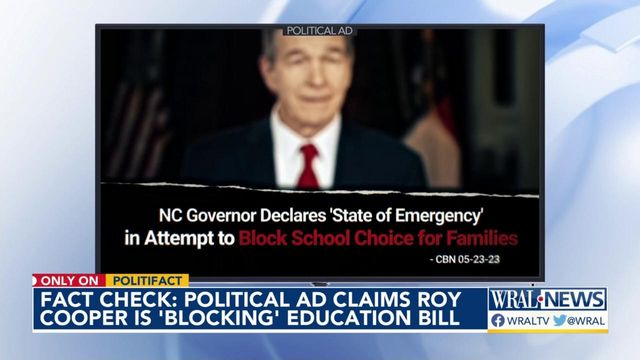Fact check: Ad claims Roy Cooper is 'blocking' school choice bill
A controversial new television ad that draws imagery from Alabama’s famous school segregation battle says North Carolina Gov. Roy Cooper is preventing poor families from accessing public money for private schools.
“Gov. Roy Cooper is blocking a pioneering school choice bill that would give thousands of low-income parents the funds to allow their kids to get a high-quality education — and a chance for a better life,” a narrator says in the ad.
Conservative group Unleash Prosperity Now launched the ad as part of its national campaign attacking Democrats who oppose school choice bills.
Text displayed on the ad cites a May 23 Christian Broadcasting Network article about Cooper’s opposition to North Carolina Senate Bill 406. Known as the “Choose Your School, Choose Your Future” Act, the bill would expand the state’s Opportunity Scholarship program to enable more families to qualify for vouchers to send their children to private schools.
Cooper, a Democrat, has opposed vouchers in the past. But he likely isn't the reason this bill stalled in the legislature. The Republican-led legislature hadn't advanced it to Cooper’s desk when the ad initially aired. The House passed a similar version in May. But the Senate’s version never came up for a floor vote.
Republican legislators ultimately incorporated the proposal in the state budget, which was still being debated this week. If approved, as lawmakers expect, only then would Cooper have the opportunity to block it through a veto.
The ad also compares Cooper to the late Alabama Gov. George Wallace, who opposed Black children attending the same public schools as white children. The Opportunity Scholarship program doesn’t deal with race at all.
Cooper says he opposes the school voucher expansion because it diverts more public funds to private schools, which he doesn’t believe to be inherently “high quality,” as the ad suggests. An analysis from the state’s Office of State Budget and Management found that the proposed voucher expansion could reduce public school funding by more than $200 million.
In addition to overstating what Cooper has done to oppose the bill, the ad also misstates what effects it would have on low-income families, who already qualify for vouchers even if the bill — or the budget — go nowhere.
Funds for parents
North Carolina’s Opportunity Scholarship program went into effect in 2014. It gives families who meet certain income criteria — generally lower than the state’s median household income — special access to its funds to pay for private school.
Unleash Prosperity Now claimed that if Senate Bill 406’s proposals aren’t enacted, funds would be denied to “low-income parents.” That’s misleading.
Senate Bill 406 would increase the maximum award for lower-income students by 11.1% to $7,213 per student. But low-income families — and some middle income families — would still have access to Opportunity Scholarships if the bill dies because of the way the existing program is structured.
The GOP proposal would be to lift the program’s existing income caps and open eligibility to students already attending private schools. Vouchers would be awarded to families on a sliding scale, with low-income families still receiving the largest vouchers.
Representatives of the Committee to Unleash Prosperity didn’t respond to questions about the ad. But group co-founder Stephen Moore told Fox News that Democrats should want more students to go where they believe they’ll get the best education. Moore accused Democrats of opposing school choice programs to satisfy teachers’ unions.
“Parents deserve to be in charge of their children’s education, not politicians and especially not unelected union bosses,” Moore said in a statement to Fox News.
Cooper’s opposition
The ad claims Cooper is blocking the program’s expansion. Legislatively speaking, that isn’t true. The proposal hasn’t made it to his desk for his signature or veto, nor has a similar version in the House. Even if he did veto it, Republican backers of the bill carry veto-proof supermajorities in both chambers of the legislature.
In May, after legislators introduced proposals to expand the program, Cooper made an appeal to the voting public. He declared a “State of Emergency for Public Education” — an unofficial, symbolic gesture meant to raise awareness of the proposed Opportunity Scholarship expansion and other GOP-backed education bills. He urged residents to contact their legislators to speak out against the proposals.
Legislative leaders ultimately folded the proposed Opportunity Scholarship expansion into the state budget, which they released Wednesday after months of negotiating.
It’s unclear what Cooper, who has called for Opportunity Vouchers to be phased out, will do with the budget. Since taking office in 2017, he has vetoed some budgets and signed others — including budgets in 2021 and 2022 that provided funding for the Opportunity Scholarship program. Cooper argued that, on balance, the good parts of those budgets outweighed the bad.
This year, the budget is tied to an expansion of Medicaid benefits that Cooper has sought for years. Despite his objections to many Republican ideas, it’s possible he would sign their proposed budget or let it become law without his signature.
In addition to the ad’s claims about the bill being blocked, Cooper spokesperson Jordan Monaghan took issue with the ad’s suggestion that private schools are inherently high-quality. “This claim is not just an insult, it is factually wrong since public schools face rigorous requirements for testing, licensure and educational outcomes, while private schools are not measured in any similar way,” Monaghan said.
Research is mixed on the impact of private school vouchers on student achievement, WRAL has reported. Studies show performance declines in some states among students who transferred to private schools, while studies in other areas showed higher graduation rates among voucher recipients. In North Carolina, no testing data exist to compare outcomes.
Our ruling

An ad from Unleash Prosperity Now claimed that Cooper “is blocking a pioneering school choice bill that would give thousands of low-income parents the funds to allow their kids to get a high-quality education.” The ad alluded to Senate Bill 406, a bill that would expand the state’s voucher program.
While Cooper spoke out against the bill – and urged residents to oppose it – he hasn’t taken any legislative action to block it because the bill never made it to his desk. The bill’s proposals are now part of legislators’ state budget plan which, at the time this fact check was published, hadn’t made it to Cooper’s desk either.
The proposal would benefit lower-income families, but its demise wouldn’t deprive them of the voucher access they already have. It would lift the program’s existing income caps and open eligibility to students already attending private schools.
The ad’s statement contains elements of truth but ignores critical facts that would give a different impression. We rate it Mostly False.













